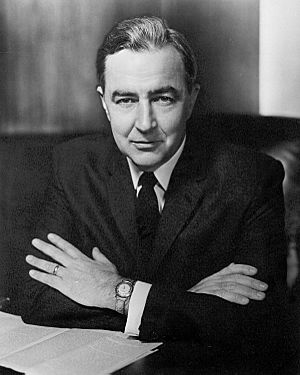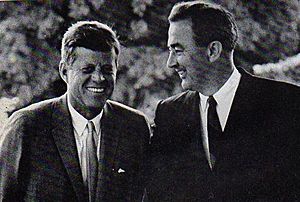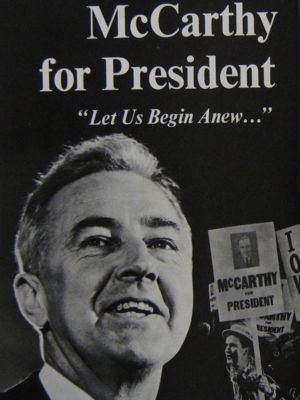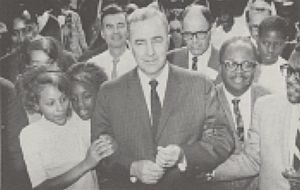Eugene McCarthy facts for kids
Quick facts for kids
Eugene McCarthy
|
|
|---|---|
 |
|
| United States Senator from Minnesota |
|
| In office January 3, 1959 – January 3, 1971 |
|
| Preceded by | Edward John Thye |
| Succeeded by | Hubert Humphrey |
| Member of the U.S. House of Representatives from Minnesota's 4th district |
|
| In office January 3, 1949 – January 3, 1959 |
|
| Preceded by | Edward Devitt |
| Succeeded by | Joseph Karth |
| Personal details | |
| Born |
Eugene Joseph McCarthy
March 29, 1916 Watkins, Minnesota, U.S. |
| Died | December 10, 2005 (aged 89) Washington, D.C., U.S. |
| Political party | Democratic |
| Other political affiliations |
Democratic-Farmer-Labor |
| Spouse |
Abigail Quigley
(m. 1945; sep. 1969) |
| Children | 5 |
| Alma mater | Saint John's University (BA) University of Minnesota (MA) |
| Profession |
|
| Military service | |
| Allegiance | |
| Branch/service | |
| Unit | Military Intelligence Division |
| Battles/wars | World War II |
Eugene Joseph McCarthy (born March 29, 1916 – died December 10, 2005) was an American politician, writer, and teacher from Minnesota. He served in the United States House of Representatives from 1949 to 1959. Later, he became a United States Senator from 1959 to 1971.
McCarthy is best known for running for president in the 1968 election. He challenged the sitting president, Lyndon B. Johnson, because he was against the Vietnam War. McCarthy tried to become president five times in total, but he never won.
Born in Watkins, Minnesota, McCarthy first became an economics professor. He had studied at the University of Minnesota. During World War II, he worked as a code breaker for the U.S. government. In 1948, he was elected to the House of Representatives. Later, in 1958, he won a seat in the Senate.
McCarthy was a strong supporter of Adlai Stevenson II for president in 1960. He was also considered to be a vice-presidential candidate in 1964. He helped create the Immigration and Nationality Act of 1965. However, he later felt that some parts of this law caused problems.
As the 1960s continued, McCarthy became a leading voice against the Vietnam War. When Robert F. Kennedy decided not to run against President Johnson, McCarthy stepped up. He ran for president in 1968 on a promise to end the war. Many people thought he had no chance. But after the Tet Offensive, more Americans began to oppose the war. McCarthy did surprisingly well in the New Hampshire primary. After this, Kennedy joined the race, and President Johnson announced he would not run again.
McCarthy and Kennedy each won some primary elections. But Kennedy was assassinated in June 1968. At the 1968 Democratic National Convention, Vice President Hubert Humphrey was chosen as the presidential candidate.
McCarthy did not run for reelection to the Senate in 1970. He tried for president again in 1972 but did not do well. He ran in a few more elections after that but never won another office. In the 1976 presidential election, he ran as an independent candidate. He received less than 1% of the votes.
Contents
Early Life and Education
Eugene McCarthy was born in Watkins, Minnesota. His mother, Anna Baden McCarthy, was a very religious Catholic woman. His father, Michael John McCarthy Jr., was a postmaster and cattle buyer.
McCarthy grew up in Watkins with his parents and three brothers and sisters. He went to St. Anthony's Catholic School. He spent many hours reading books from his aunt's Harvard Classics collection. He was inspired by the monks at St. John's Abbey and University. He went to high school there, at Saint John's Preparatory School, and graduated in 1932.
He also attended Saint John's University, finishing in 1935. McCarthy earned his master's degree from the University of Minnesota in 1939. He taught in schools in Minnesota and North Dakota from 1935 to 1940. Then, he became a professor of economics and education at St. John's from 1940 to 1943. While at St. John's, he also coached the hockey team for one season.
In 1943, McCarthy thought about becoming a monk. He spent nine months as a Benedictine novice at Saint John's Abbey. After this time, he left the monastery. In 1944, he joined the Army. He worked as a code breaker for the Military Intelligence Division in Washington, D.C. From 1946 to 1949, he taught sociology and economics at the College of St. Thomas in St. Paul, Minnesota.
Serving in Congress
U.S. House of Representatives
McCarthy joined the Minnesota Democratic–Farmer–Labor Party. In 1948, he was elected to the United States House of Representatives. He represented Minnesota's 4th congressional district until 1959. He became a leader for young, liberal politicians, often called "McCarthy's Marauders."
In 1952, he had a famous televised debate with Senator Joseph McCarthy from Wisconsin. They were not related. Eugene McCarthy cleverly used humor to show how unfair the other Senator's arguments were. In 1958, Eugene McCarthy was elected to the U.S. Senate.
U.S. Senate

As a Senator, he was part of important groups like the Senate Foreign Relations Committee. This committee deals with how the U.S. interacts with other countries. McCarthy became more widely known in 1960. He gave a speech supporting Adlai Stevenson II for president. He famously joked about himself, saying he was "twice as liberal as Hubert Humphrey, twice as intelligent as Stuart Symington, and twice as Catholic as Jack Kennedy." In 1964, he was considered as a possible running mate for President Lyndon Johnson. However, fellow Minnesota Senator Hubert Humphrey was chosen instead.
McCarthy helped create the Immigration Act of 1965. This law changed how people could immigrate to the U.S. Later, he said he regretted some parts of the law. He felt it gave too much control to individuals bringing relatives to the country. He then became an advisor for the Federation for American Immigration Reform. This group works to reduce immigration.
In 1964, McCarthy met with Che Guevara in New York City. Guevara was a revolutionary from Cuba. They talked about improving relations between the U.S. and Cuba.
1968 Presidential Campaign
Challenging President Johnson
In 1968, a group of Democrats against the Vietnam War asked McCarthy to run for president. They wanted him to challenge the current president, Lyndon B. Johnson. Senator Robert F. Kennedy had first been asked but said no. McCarthy agreed to run. His goal was to make the government change its approach to the Vietnam War.
Many anti-war college students helped McCarthy's campaign. They traveled to New Hampshire to support him. Some students even cut their long hair and shaved their beards. This was so they would look more traditional when campaigning door-to-door. This led to the saying, "Get clean for Gene."
McCarthy announced his campaign on November 30, 1967. He said he was worried the government was willing to pay any price for a military win in Vietnam. At first, political experts thought he had no chance. But public opinion changed after the Tet Offensive in early 1968. Many Democrats became unhappy with the war.
McCarthy did surprisingly well in the March 12 New Hampshire primary. He received 42% of the vote, while Johnson got 49%. This showed that many Democrats were divided over the war. It became clear that Johnson might not be reelected.
Kennedy Enters the Race
On March 16, Robert F. Kennedy announced he would run for president. Many Democrats thought Kennedy was a stronger candidate than McCarthy. On March 31, President Johnson shocked everyone by saying he would not seek reelection.
After Johnson withdrew, McCarthy won the primary in Wisconsin. He also won in Oregon, which was a big victory over Kennedy. McCarthy presented himself as an honest politician. He was known for his quick wit. He sometimes criticized his opponents, including Kennedy.
Many people who first supported McCarthy later joined Kennedy's campaign. They urged McCarthy to drop out and support Kennedy. But McCarthy felt Kennedy had let him do the hard work of challenging Johnson. So, McCarthy decided to keep fighting to win the nomination himself.
Hubert Humphrey joined the race later. He had strong support from the Democratic Party leaders. He did not compete in many primaries.
McCarthy and Kennedy faced off in California. They knew this state's primary would be very important. They campaigned hard, and polls showed a close race. In a TV debate, McCarthy made some comments that hurt his campaign. He suggested accepting a government with Communists in South Vietnam. He also said that inner-city Black people might need to move to solve urban problems. Kennedy strongly criticized these ideas.
Kennedy won the California primary on June 4. But after his victory speech, he was shot and died soon after. McCarthy stopped campaigning for several days.
Even though McCarthy did well in several primaries, he only got 23% of the delegates at the 1968 Democratic National Convention. This was because state party leaders largely controlled who became a delegate. After Kennedy's death, many of his delegates supported George McGovern instead of McCarthy. Humphrey won the nomination. McCarthy later said he would vote for Humphrey but did not officially endorse him.
Later Political Life
1972 Presidential Campaign
McCarthy ran for president again in 1972. He sought the Democratic nomination. However, he did not do well in the early primaries in New Hampshire and Wisconsin. He soon dropped out of the race.
1976 Presidential Campaign
After 1972, McCarthy left the Democratic Party. He ran as an Independent candidate for president in 1976. During this campaign, he focused on individual freedoms. He also wanted to shorten the work week to create more jobs. He supported getting rid of nuclear weapons.
He spent a lot of time fighting laws that made it hard for independent candidates to get on the ballot. He wanted voters to reject the idea of only having two main political parties. He managed to get on the ballot in 30 states. This helped make it easier for other independent candidates in the future. He had many different running mates in states where one was required.
Nationally, McCarthy received about 740,000 votes. This was less than 1% of the total votes. His best result was in Oregon.
Other Activities
McCarthy was against some laws about campaign funding after the Watergate scandal. He was part of an important court case called Buckley v. Valeo in 1976. The U.S. Supreme Court decided that some parts of federal campaign finance laws were unconstitutional. This case helped remove limits on how much money could be spent on political campaigns.
In 1980, McCarthy was very unhappy with President Jimmy Carter. He even appeared in an advertisement for Libertarian candidate Ed Clark. He later supported Ronald Reagan for president.
Final Campaigns
In 1982, McCarthy ran for the U.S. Senate in Minnesota. But he lost the Democratic primary election.
In the 1988 election, McCarthy ran for president again. He was on the ballot for some smaller parties. He supported protecting American industries from foreign competition. He also supported Reagan's missile defense system. He received about 30,000 votes.
In 1992, he rejoined the Democratic Party. He entered the New Hampshire presidential primary. However, he was not allowed to participate in the first televised debate. He and other excluded candidates protested. He received over 100,000 votes in the 1992 primaries.
Writing and Personal Life
After leaving the Senate in 1971, McCarthy became a senior editor at a publishing company. He also wrote columns for newspapers. In the 1960s, he started writing poetry. His political fame made more people interested in his poems. He once wrote, "If any of you are secret poets, the best way to break into print is to run for the presidency." He published a collection of his poems in 1997.
McCarthy and his wife, Abigail Quigley McCarthy, had five children. In 1969, they separated after 24 years of marriage, but they never officially divorced.
Death and Legacy
Eugene McCarthy died on December 10, 2005, at age 89. He passed away from problems related to Parkinson's disease. He had been living in a retirement home in Washington, D.C. Former President Bill Clinton spoke at his funeral.
After his death, the College of Saint Benedict and Saint John's University named their Public Policy Center after him. In 2008, the Democratic Party honored him at their national convention. However, there was a mistake: a photo of him was shown with the name "Senator Joseph McCarthy." This was confusing because Joseph McCarthy was a different, well-known Republican Senator.
In 2009, St. John's University created the Eugene McCarthy Distinguished Public Service Award. McCarthy's official papers from his time in Congress are kept at the Minnesota History Center. They include many documents, photos, and recordings.
Presidential Election Results
| McCarthy's presidential campaign results | |||
| Election | Party | votes | % |
|---|---|---|---|
| 1968 (primary) | Democratic Party | 2,914,933 | 38.7% |
| 1972 (primary) | Democratic Party | 553,352 | 1.7% |
| 1976 | Independent | 740,460 | 0.91% |
| 1988 | Consumer | 30,905 | 0.03% |
Books by Eugene McCarthy
- Frontiers in American Democracy (1960)
- Dictionary of American Politics (1962)
- A Liberal Answer to the Conservative Challenge (1964)
- The Limits of Power: America's Role in the World (1967)
- The Year of the People (1969)
- Mr. Raccoon and His Friends (1977); children's stories
- A Political Bestiary, by Eugene J. McCarthy and James J. Kilpatrick (1979)
- The Ultimate Tyranny: The Majority Over the Majority (1980)
- Gene McCarthy's Minnesota: Memories of a Native Son (1982)
- Complexities and Contrarities (1982)
- Up Til Now: A Memoir (1987)
- Required Reading: A Decade of Political Wit and Wisdom (1988)
- Nonfinancial Economics: The Case for Shorter Hours of Work, by Eugene McCarthy and William McGaughey (1989)
- A Colony of the World: The United States Today (1992)
- Eugene J. McCarthy: Selected Poems by Eugene J. McCarthy, Ray Howe (1997)
- No-Fault Politics (1998)
- 1968: War and Democracy (2000)
- Hard Years: Antidotes to Authoritarians (2001)
- From Rappahannock County (2002)
- Parting Shots from My Brittle Bow: Reflections on American Politics and Life (2005)
See also
 In Spanish: Eugene McCarthy para niños
In Spanish: Eugene McCarthy para niños
- List of peace activists
 | Selma Burke |
 | Pauline Powell Burns |
 | Frederick J. Brown |
 | Robert Blackburn |



